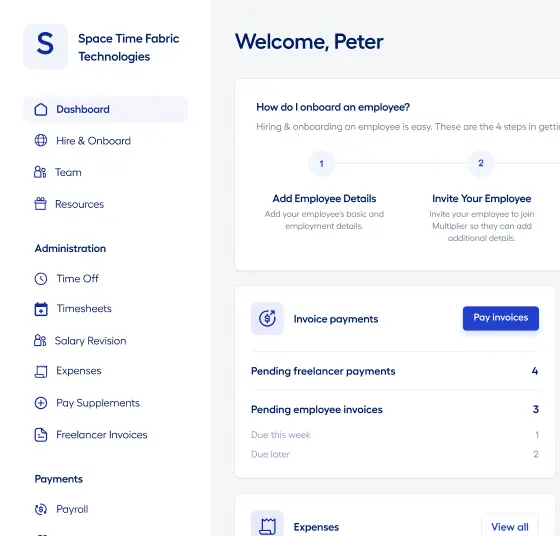Disadvantages of Hiring Contract Employees
In this digital age, it’s not uncommon to hire freelancers – otherwise known as independent contractors. While a lot of startups have recently taken to hiring freelancers because of their generally cheaper rates and the ease that comes with the flexibility that freelancers provide, there are multiple risks that come hand in hand with hiring independent contractors.
Before we dive into the risks, let’s first define what an independent contractor is. This is quite tricky in itself as many countries have different definitions of what an independent contractor is. So if you’re looking for a legal definition, it would be best to check with the labor laws of the country that you’re interested in.
For our simple and explanatory purposes, an independent contractor is someone who provides goods or services to a person or entity as a nonemployee. There is usually a written or verbal agreement between the two parties to solidify the exchange of goods or services.
It’s essential that you clearly distinguish between a full-time employee and a contractor. In short, you’ll have to supervise, dictate, and pay taxes with a full-time employee. On the other hand, a contractor provides services to you in return for payment and is independent of your business.
Within a year’s time, you should be able to convert independent contractors into full-time employees. If you’re satisfied with the work your freelancer or contractor does, you may want to consider hiring them full-time.
Whether you hire an independent contractor locally or internationally, or whether they work remotely or show up at your office everyday, there are still a handful of risks that come with this:
1. You have less control
If you’re a manager, supervisor, or boss that likes to monitor their workers and have quite a lot of say when it comes to how work gets done and more, then hiring a contractor is definitely not for you. Because contractors are not treated like employees, they have a certain autonomy that prevents a lot of interference from your end.
Once you start putting in requests such as requiring your contractors to be present during certain times or requiring the use of certain tools for their work, your actions may be seen as more fitting for full-time employees, and can be grounds for misclassification.
Another disadvantage is the consistency of work. If your workforce focuses heavily on independent contractors, your turnover rate will undoubtedly be high. The constant revolving door of new faces can be inconvenient and disruptive, not to mention, the quality of work will be almost impossible to control as well.
2. You may have tax consequences
One of the reasons many people choose to hire contractors is because they don’t have to pay benefits and taxes. The independent contractor, who should only be working for a short period of time, will hypothetically not need benefits and should pay his or her taxes independently.
To be able to pay their own taxes, freelancers will usually have to register themselves as an independent entity. However, in many developing markets such as India, the Philippines, and Vietnam, freelancers shy away from registering themselves due to the hassle of following the government-mandated steps, therefore breaking multiple labor laws.
Should you fail to withhold the income tax of a worker who has been misclassified as an independent contractor and the individual has failed to pay his or her taxes, the consequences and fines can be exceedingly high for your company.
3. You take on a lot more liability
Yes, one can argue that even if you fully employ an individual, it still comes with a lot of liability. However, when you hire independent contractors, you’re opening yourself up to a whole new host of liabilities you can easily avoid with your full-time employees.
Some examples of liabilities you may encounter are injuries suffered on the job, being sued for negligence and/or wrongful acts, and even overtime, minimum wage, or unemployment compensation claims. If legal action is taken against you by a misclassified independent contractor you may find yourself in hot and very expensive waters.
4. You may encounter issues with rights
This can go two ways. First, you may encounter problems with copyrights. Let’s say you hire a freelancer to take photos for your website. In a worst case scenario, the contractor may claim that you do not own their work, making it difficult for you to share or use.
On the flip side, there is also another issue with intellectual property rights. Even if you have the contractor sign a non-disclosure agreement, you are still at risk of someone taking and using your intellectual property. Taking legal action against the independent contractor will also be very difficult and tedious if you do not have a company presence in the independent contractor’s country.
5. You always have the possibility of being audited
All government labor departments rightfully want to see employers treat their employees right. That means giving them benefits, following the law, paying taxes, etc. Should a representative decide to investigate or audit your company, you may be faced with a charge of misclassification.
We’ve mentioned misclassification a few times already, but this really comes to play when you’re being audited. The fine lines of misclassification will differ depending on what country you’re in, but generally speaking misclassification occurs when an independent contractor is considered to be doing the work of a full-time employee.
Like we’ve mentioned previously, should you get caught on a misclassification charge, the fines and penalties can be costly for your and the independent contractor. In 2018, the Philippines’ Department of Labor and Employment cracked down on the Philippine Long Distance Telephone Company, mandating that they regularize over 8,000 contractual workers, and pay a settlement fee of approximately $1.8M USD.
6. You don’t have their loyalty
A loyal employee is a great asset. There is a saying that goes, “Loyal employees in any company create loyal customers, who in turn create happy shareholders.” Whether you believe in this or not, you cannot underestimate the value of a loyal employee.
Unlike full-time employees who have the chance and environment to witness the company’s – as well as their own – personal growth, independent contractors come and go as their contract dictates. They have no loyalty and dedication to you as their employer or to your company, and cannot be expected to do anything more than what their contract specifies.
7. You have no guarantee
Even without all of the previous risks we mentioned, it’s a risk in itself to hire an independent contractor who is not licensed or referred. You can ask for a portfolio or some sample works, give out tests, and have an interview, but at the end of the day, a contractor is only as good as his or her word.
At best, you’ll have a good one who ticks all the checkboxes and fulfills all their deliverables. At worst, you’ll have someone who either botches up the job or doesn’t even complete it. Compare this to hiring someone full time and being able to manage and supervise their work, control their pay, and incentivize them to work harder.
What are your options now?
While there are benefits to hiring freelancers and independent contractors, the risks and dangers that come alongside it can be costly. What you can do to avoid these liabilities is fully employ your independent contractors. You can easily do this with a Professional Employer Organization (PEO) such as Multiplier who will take care of your employees’ compliance and payroll for you. Leave the stress of complying with labor laws and the headache of figuring out local payroll to us, while you focus on what’s important – your business.
Learn more about how you can use Multiplier to avoid the risks and dangers of hiring an independent contractor. You can visit our website or contact us today.







